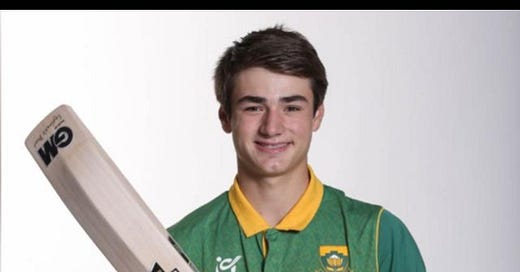Welcome back to the Rookie Series. “The Rookie Series”, as the name suggests, features the six rookies picked by SA20 franchises at the 2023 auction. These pieces are designed to bring these incredible young players closer to you, the fans. They draw the curtain and allow you to look into their world. We’ll have a new “Rookie series” essay over the next few weeks. It should be really fun. This week’s article is on Ronan Herrmann, the Joburg Super Kings’ rookie for 2024. Thanks, as always, for your support!
No. 1: Steve Stolk
The Pretoria Capitals were looking for a wicketkeeper for their intra-squad match - Kusal Mendis, their other wicketkeeper, had yet to arrive. Bongani Ndaba suggested Ronan Herrmann to the coaching staff. It was an opportunity that he jumped at. He had only one request, “He asked me if it was possible for me to give him a few throwdowns after the match. He didn’t think he would get a chance to bat. He said, ‘Maybe if the coaches see me in the nets they might keep me in mind,’” says Ndaba.
He saw in Ronan’s eyes the same hunger he had seen in 2016, only this time Ronan’s eyes were not welling up in tears. Ndaba was happy to oblige him. But, as it turned out, he didn’t need that net session for anyone to notice him. He was already on a few teams’ radars. A few months later, the Joburg Super Kings offered him a rookie contract.
One of the first things you notice as you enter Marius Herrmann's office is the bat on the shelf. It has battle scars, red indents of where the ball made contact; circles, semi-circles, and crescents. If you move in close, you can see the contact points of the times when Ronan Herrmann edged deliveries.
The Kookaburra bat holds pride of place on the shelf. It was the first real bat Marius bought for his son after a slew of mini-bats. It cradles so many memories. Father and son played backyard cricket with it. Ronan scored his first century with that bat. He was nine. Marius was so moved by the moment that he cried with joy.
When Moeen Ali was born, his father, Munir Ali, rubbed a mini cricket bat on his forehead. It was their way of writing the newborn's fate. Munir had picked up the ritual from his twin brother, Shabir, who had rubbed a cricket ball on his newborn son's foreheads a few years before. Shabir wanted his sons to be bowlers, hence the ball. Munir wanted his sons to be batters, so he used a bat.
Unlike Munir Ali, Marius Herrmann was not a cricket dad. His background was in rugby and weightlifting no sporting dreams for Ronan. Like any other parent, Marius marvelled at his son's hand-eye coordination - Ronan could hit a golf ball off the tee and instinctively understood how to pass a rugby ball at four. A Tiger-dad/Tiger-mum would have taken that as a sign.
Other parents could have taken the hundred Ronan scored at nine as another sign of a sports career-in-waiting. Marius’ reaction was nowhere close to that. “When Ronan scored that 100, I thought, ‘Okay, let's enjoy this and see where it goes,’” he says. There were no grand plans or great expectations, Marius was just happy that Ronan had found a sport he was happy to play.
From the moment he could move independently, Ronan was a menace. The kid was a ball of energy and couldn't keep still. At any given moment he was either throwing, kicking, batting, hitting or chasing a ball. Sports kept him occupied.
Marius bought the Kookaburra bat because, from the age of six or seven, Ronan showed a greater love for cricket over other sports and it was the best tool for him when he graduated to hard balls at school. “He actually guided himself in a direction in the sense that you could see he loved the cricket aspect of it more,” says Marius.
This newsletter is completely reader-supported. If you’re willing and able, please consider supporting it in one of two ways, leaving a tip or becoming a Patreon. Thank you so much for your time and investment!
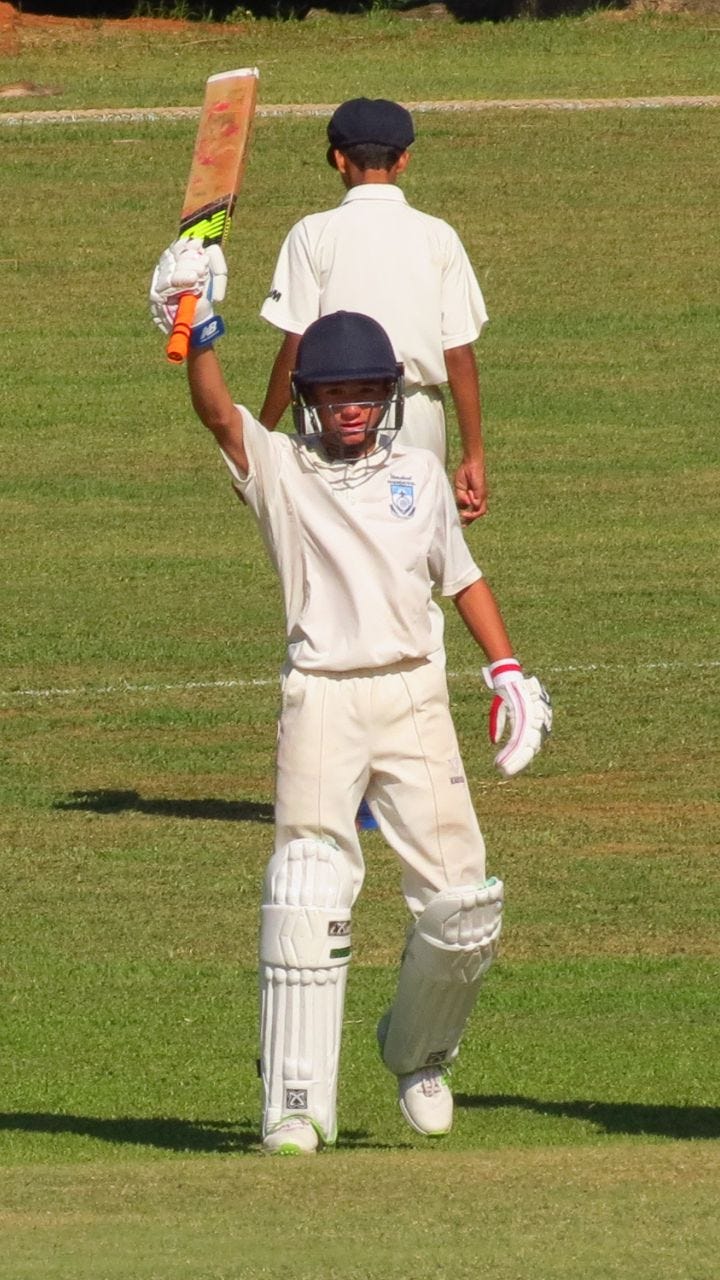
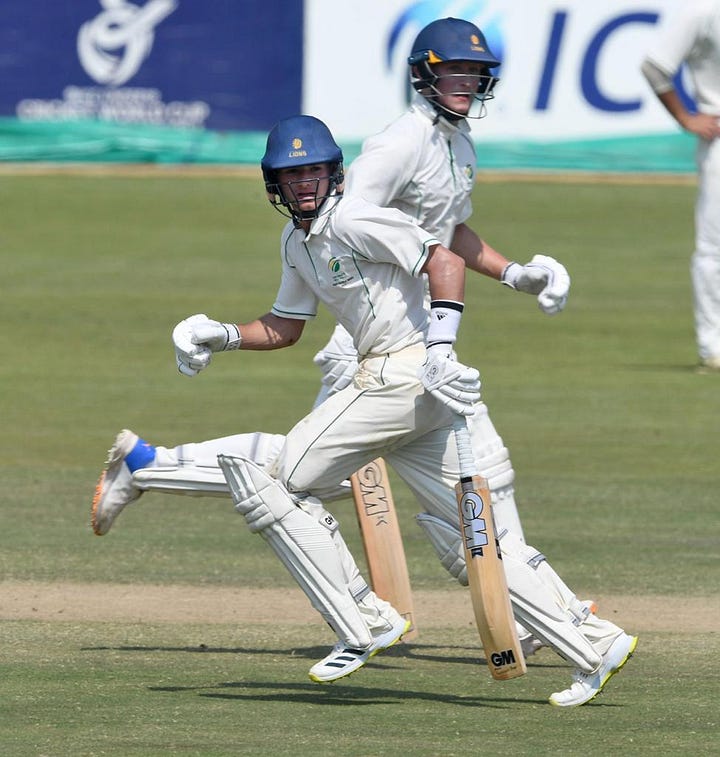
Ronan Herrmann eats short balls for breakfast. He has done so from the moment he has known how to hold a bat properly. When they played backyard cricket, one of the rules was if a batter hit the ball to the wall, they were out. One stayed in by blocking and driving down the ground. Because he was a short kid, the best tactic against Ronan was attacking him with the short ball, and that’s what his cousins did. They employed the short ball.
His taller cousins did not have to try to bowl short, Ronan was already short and some deliveries on a good length were short-pitched to him. He learned to hook, pull and take evasive action as a matter of survival. But, of course, Ronan didn’t just look to survive, he looked to dominate.
The matches were three-day Tests, with multiple intervals for meals and drinks. Ronan was always an equal match to their short-pitched bowling. Ronan didn't parry while taking evasive action. He rose to his toes and pulled as if his life depended on it. His innings often spilt into the second day.
When he joined Kagiso Cricket Club, Ronan was 13. He was the youngest and smallest player on the team. His size was a problem for some rugby coaches, and they chose to leave him out of teams because of it. It is also possible that his size was the reason why he wasn’t selected for the Gauteng Under-13 sides, both A and B, despite being the highest run-scorer in his age group at the trials held at St. Stithians.
“I was 36 kgs when I walked into high school and it was a big challenge for me even when I played club cricket because I was so small the guys I was playing against thought they could have bullied me and actually intimidate a young guy like me. But luckily I wasn't really bothered. At that stage I was just focusing on myself I must say for a small boy. If I look back I was pretty mentally strong. There were a lot of chats before that where people told me I wouldn’t make it because of my size,” says Ronan.
Watching him face bigger and older bowlers was like watching a bantamweight fighter going toe-to-toe with a heavyweight boxer. First, the big fast bowlers tried to stare him down. They tried to scare him using the short ball when he didn't back down. When that failed, they chirped him. Ronan Herrmann always had a reply ready: "Stop wasting your time. I have faced bigger players on the rugby field and they didn’t scare me. Get on with it."
In one of his first innings for Kagiso CC, whom he debuted for at 13, Ronan opened the batting and fielded several short balls from a strong Old Edwardians bowling lineup that featured the talents of bowlers like Mitch van Buuren. He was unfazed as he scored a breezy 72 runs.
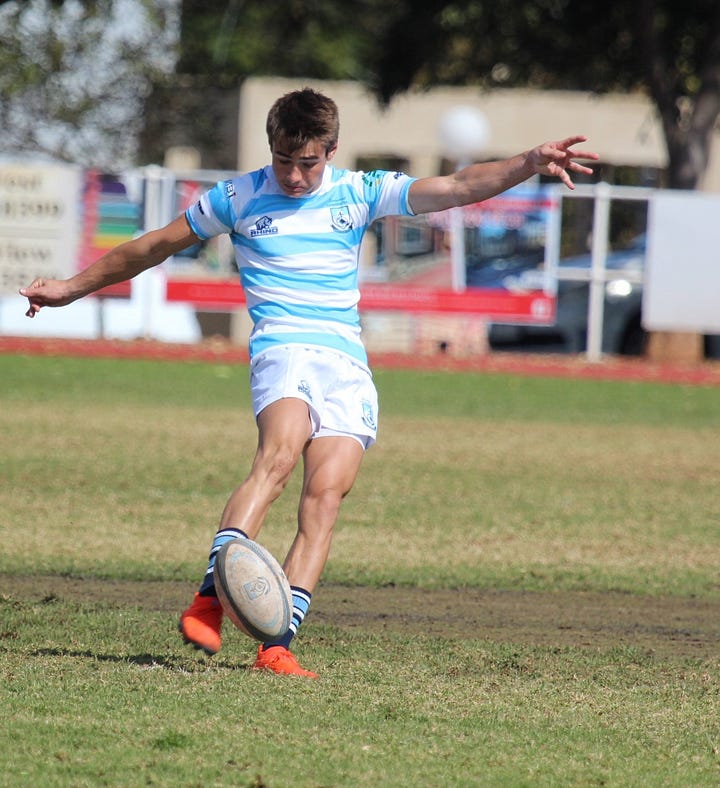

Bongani Ndaba was always on the lookout for young cricketers to bring to St. Stithians, that’s why he was watching the Under-13 trials. He knew almost immediately that Ronan was a special cricketer. The sound of the bat when he made contact made you sit up and pay attention. Ronan was small but struck the ball with authority. His calling was on point and he ran between the wickets with purpose. He was doing all the things that Ndaba taught his students. According to Ndaba, Ronan showed a good understanding of the game.
That’s why he didn’t understand it when the Under-13 coaches did not pick Ronan for the age group. “I told them, ‘You cannot tell me that there is a kid better than that boy.’ But, they stuck to their decision and there was nothing I could do about it,” says Ndaba.
“After the trials, Bongani came to us and he said, ‘I noticed Ronan is disappointed, but let's take Ronnie and let him come to Kagiso.’ I asked him why and he said, ‘I believe in the boy and we're gonna do wonders with his kid,’” says Marius.
Playing for a club like Kagiso is attending the school of hard knocks. They compete with better-resourced clubs with lineups that are 10 times better. Their batters are always in collapse mode and their bowlers are under constant pressure. “It teaches you the value of your wicket. A lot of times the guys find themselves on 80 for three or 80 for four. If Ronan scored 100, then we had a chance of reaching 220 or more. So, I always told Ronan that he was our big star and we depended on him,” says Ndaba.
Ronan thrived in that environment. He learned how to construct an innings at Kagiso CC.
Before Ronan Herrmann, Noordheuwel Hoerskool had never had a representative at the Khaya Majola Week. None of their alumni had ever represented South Africa at Under-19 level. It is quite a feat. There are countless players who did not come from traditional cricket powerhouses who failed to make careers out of cricket, despite being talented.
Schools like Affies, Maritzburg College, KES, Wynberg, Grey High, Grey College and others have better facilities and coaching, something that schools like Noordheuwel do not have. “These schools have former professional cricketers on their coaching staff. You cannot underestimate the value these people bring to the development of young cricketers. Their mentorship is crucial,” says Brad Bing, the founder and director of Sporting Chance.
However, Ronan Herrmann went to Noordheuwel by design. “I grew up in an Afrikaans home and I think I would have struggled a lot with the language if I had gone to an English-speaking school at that age. It is different now because I am older, I can fit into any situation,” says Ronan.
The decision meant that he had to work twice as hard to be noticed. Each time he was overlooked despite performing well at trials, Ronan refused to let go of his dreams because he had not attended a fancy school, he constantly told himself, ‘If you work hard and the stats are there, they can't take anything away of you.’ He was going to force them to notice him. At Under-13 and 14, the plan didn’t work. He scored buckets of runs and failed to get selected. At the Under-15 trials, he scored 400 runs in five games to earn his spot in the squad in the Gauteng team.
By then, Marius had constructed nets for him at home where he had a couple of sessions a day, one in the morning before leaving for school and the other one late in the day. At home, his family fed him balls and Jared Newton, a private coach, gave him instruction. In between he trained at school and with Kagiso CC, where Bongani Ndaba gave him guidance. It literally took a village of small-town cricket lovers to raise Ronan Herrmann the cricketer.
“Every level Ronan has reached, I cried my eyes out. I can even get emotional now just talking about it. I wasn't a cricket player, but I know how hard he had to work to get what he wanted. And what he had to achieve just to get noticed. I think he's called 1500 runs the first season, then in grade nine he scored 1300 and something runs, and in grade 10 another 1000 and something runs. The effort he has put in is incredible,” says Marius.
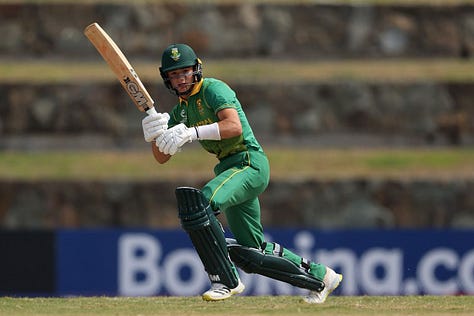
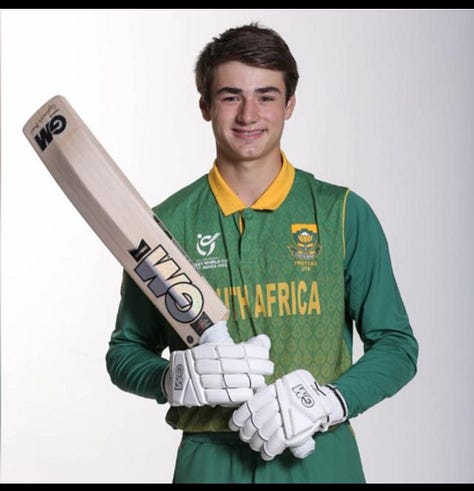
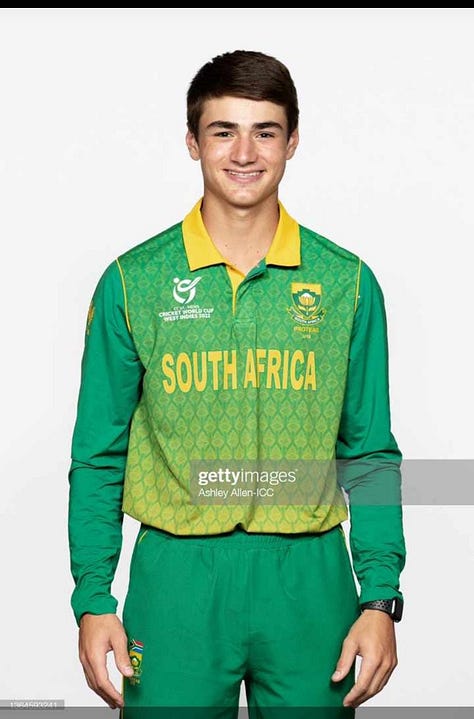
Heinrich Klaasen was behind the stumps. Tabraiz Shamsi was at point. They didn’t have to say a word. Their presence on the field was enough to give an 18-year-old debutant stage fright. Ronan Herrmann wasn’t just making his debut for the Lions against a team laden with Proteas players, and he was doing so in the final of the CSA one-day competition. But, Ronan wasn’t any run-of-the-mill 18-year-old.
Earlier in the day, the teenager had been faultless in his execution of his wicketkeeping duties. The Titans were missing the services of Quinton de Kock, who was at the IPL. However, any fan who might have wandered over to Supersport Park with the hopes of catching the Proteas wicketkeeper could be forgiven for thinking that de Kock had moved over to the other side of the Jukskei River.
Like de Kock, Ronan wears the number 12 shirt and he keeps like his role model. “So my role model since I was young was obviously Quinton de Kock. The way he carries himself and his approach to the game, he is aggressive and never looks uncomfortable,” says Ronan.
Ronan took three catches as the Lions restricted the Titans to 318. Marius’ pride is audible when he speaks of Ronan taking a catch to dismiss Heinrich Klaasen.
As he waited to face his first delivery of the match, he was 13 once again. Not the 13-year-old kid who failed to land a spot in the Gauteng A or B sides, but the version that seamlessly assimilated into the Kagiso CC culture. “On his first Saturday with the team, Ronnie went and sat amongst the guys and they had pap and s'shebo the first lunch. They had embraced him and he had embraced them. It was beautiful to see my child being happy,” says Marius.
Ronan Herrmann is happiest when he is on the cricket field, helping his team.
If you found this interesting, please share it:
You can support Stumped! by leaving a tip:
Thanks for reading. Until next time… - CS


